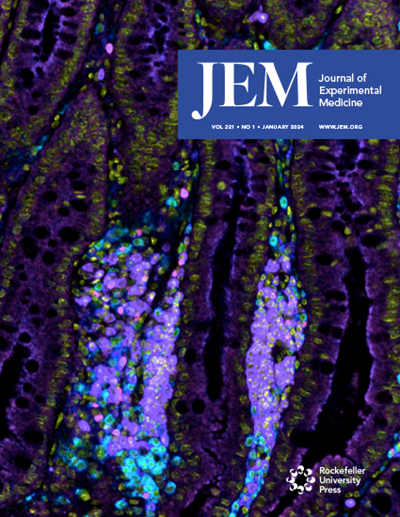Microbiota-centered interventions to boost immune checkpoint blockade therapies.
IF 10.6
1区 医学
Q1 IMMUNOLOGY
Journal of Experimental Medicine
Pub Date : 2025-07-07
Epub Date: 2025-04-22
DOI:10.1084/jem.20250378
引用次数: 0
Abstract
Immune checkpoint blockade therapies have markedly advanced cancer treatment by invigorating antitumor immunity and extending patient survival. However, therapeutic resistance and immune-related toxicities remain major concerns. Emerging evidence indicates that microbial dysbiosis diminishes therapeutic response rates, while a diverse gut ecology and key beneficial taxa correlate with improved treatment outcomes. Therefore, there is a growing understanding that manipulating the gut microbiota could boost therapy efficacy. This review examines burgeoning methods that target the gut microbiome to optimize therapy and innovative diagnostic tools to detect dysbiosis, and highlights challenges that remain to be addressed in the field.
以微生物群为中心的干预措施促进免疫检查点阻断疗法。
免疫检查点阻断疗法通过增强抗肿瘤免疫和延长患者生存期,显著推进了癌症治疗。然而,治疗耐药性和免疫相关毒性仍然是主要问题。新出现的证据表明,微生物生态失调降低了治疗反应率,而多样化的肠道生态和关键的有益类群与改善的治疗结果相关。因此,越来越多的人认识到,控制肠道微生物群可以提高治疗效果。本文综述了针对肠道微生物群的新兴方法,以优化治疗和创新的诊断工具来检测生态失调,并强调了该领域仍需解决的挑战。
本文章由计算机程序翻译,如有差异,请以英文原文为准。
求助全文
约1分钟内获得全文
求助全文
来源期刊
CiteScore
26.60
自引率
1.30%
发文量
189
审稿时长
3-8 weeks
期刊介绍:
Since its establishment in 1896, the Journal of Experimental Medicine (JEM) has steadfastly pursued the publication of enduring and exceptional studies in medical biology. In an era where numerous publishing groups are introducing specialized journals, we recognize the importance of offering a distinguished platform for studies that seamlessly integrate various disciplines within the pathogenesis field.
Our unique editorial system, driven by a commitment to exceptional author service, involves two collaborative groups of editors: professional editors with robust scientific backgrounds and full-time practicing scientists. Each paper undergoes evaluation by at least one editor from both groups before external review. Weekly editorial meetings facilitate comprehensive discussions on papers, incorporating external referee comments, and ensure swift decisions without unnecessary demands for extensive revisions.
Encompassing human studies and diverse in vivo experimental models of human disease, our focus within medical biology spans genetics, inflammation, immunity, infectious disease, cancer, vascular biology, metabolic disorders, neuroscience, and stem cell biology. We eagerly welcome reports ranging from atomic-level analyses to clinical interventions that unveil new mechanistic insights.

 求助内容:
求助内容: 应助结果提醒方式:
应助结果提醒方式:


